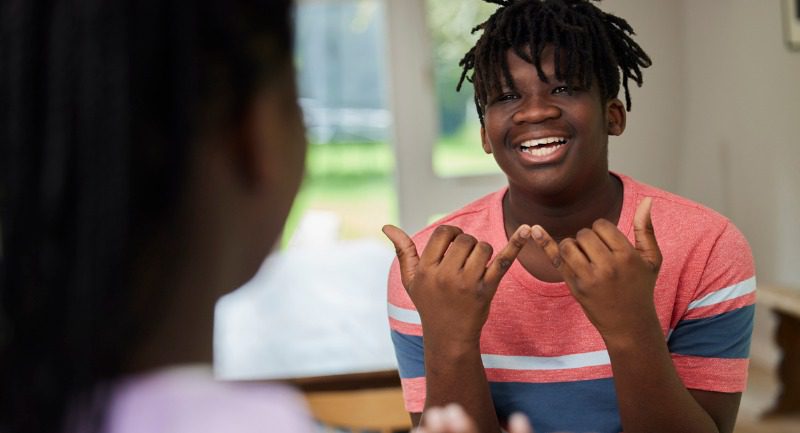Spotlight on … our Disability Group

To mark Sign Language Week, we shine the spotlight this month on the work of our Disability Group. We talk to group facilitator Collette Gallagher to find out more …
Tell us about SCRA’s Disability Group? What’s the purpose of the group and who is involved?
SCRA’s Disability Group started over four years ago. It is a network which brings together staff within the organisation who have experience of disability either directly or indirectly, have professional experience of working with people who have a disability or have an interest in improving inclusion in relation to disability. We have a fantastic group of committed people who bring a wealth of experience. It includes operational staff who work in our offices at all levels, as well as staff from our head office functions including property, communications and human resources. The combination of operational staff and head office functions and the commitment which the group has to inclusion has been the key to our success over the past four years.
What sort of work has the group been focusing on?
The group has been led by staff input as to areas to focus on and we have very much been on a journey since we first started. We have tried to focus on specific areas so that we can really increase our knowledge and awareness about particular disabilities. Much of the work we have done to date has focused on autism and neurodiversity. Our staff told us that they wanted to increase their knowledge about this area and so we have worked hard over the past four years to provide our staff with the knowledge and tools they need to support them in helping others. In addition to autism, we have done a lot of work in understanding hidden disabilities more broadly and have recently rolled out the Hidden Disabilities Sunflower Scheme. Last year we also published our very first British Sign Language (BSL) Action Plan and have been working on the actions we identified within this. One of the actions is to make more of our information available in BSL format. We recently launched our Keeping The Promise Route Plan and produced six films with BSL, sub titles and audio and also have a dedicated BSL page on our website.
Is the group making a difference?
Absolutely, the group has made a significant impact to the work of SCRA. The fact that the group is still going after all these years is a testament to how committed our organisation is to improving inclusion and diversity. Staff have a much better understanding of how a young person with autism may experience coming to a Hearing and there are more tools for us to use to support that which is of benefit in ensuring children and young people can engage in their Hearings. I am really proud of the work we have done in relation to autism. Staff also have a better understanding of Hidden Disabilities and what we can do both as an organisation and as individuals to support people who may need additional support. The highlight for me has been in rolling out the Hidden Disability scheme across all our Hearing centres and hearing the feedback from staff about this. This has been positively received by all our staff with many staff feeding back how proud being part of the scheme makes them feel.
Do you involve others in the work? Experts/Hearings-experienced young people etc?
Yes, we have worked with third sector organisations to support our journey to becoming more inclusive in relation to autism and neurodiversity and have co-produced some amazing work including our film ‘Coming to a Hearing’ for people with autism which was scripted and filmed with one of the charities we have worked with to increase our understanding. We have also co-produced Visual Information guides about some of our Hearing centres. We did this with young people with autism as well as speech and language experts and Autism Network Scotland. We have also worked with the First Tier Tribunal for Scotland (Health and Education) chamber who have provided us with lots of support in our work in relation to creating our first sensory corner. We recently worked with Deaf Action to provide training to members of our Disability Group. We want to further expand the people that we work with, recognising that people with lived experience and professionals can enhance the work we do greatly.
What’s next for the group?
We are currently in our planning phase for next year. We want to build on the important work we have done to date and continue on our journey of improvement. We will continue our work in relation to autism and neurodiversity and hope to develop a full sensory room as our next project. We also want to ensure that we complete all our actions in our BSL action plan so you will see more information being translated into BSL and placed on our website. We would really like to continue to build on our work in partnership with people or organisations who support people who have direct experience of accessing our services or of disability.
Would you welcome feedback/ideas on further improvements? If so, how can people get in touch?
I would absolutely love to hear feedback and ideas from people reading this. Please get in touch if you have suggestions, ideas or would like to give feedback on your experience of coming to a hearing or engaging with us. If you have feedback you can email equalities@scra.gov.uk. You can also contact me at collette.gallagher@scra.gov.uk. If you are a BSL user you can use contactSCOTLAND-BSL to contact us and if you would specifically like to give feedback on our BSL plan or disability related work we are or should be doing you can contact me using contactSCOTLAND-BSL on 0131 244 8665.
